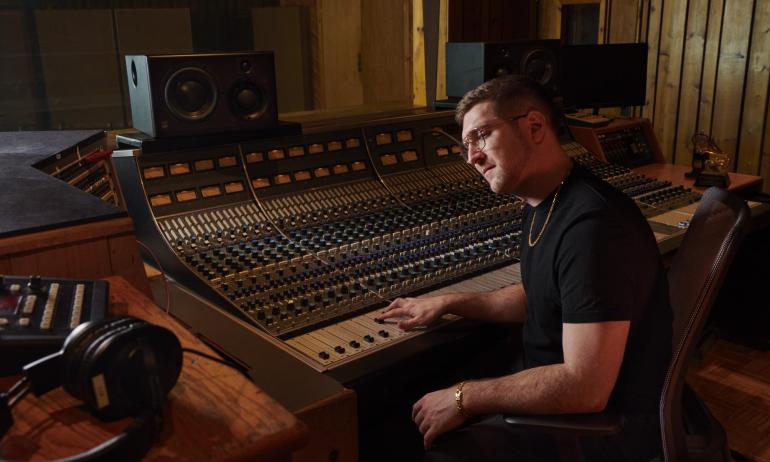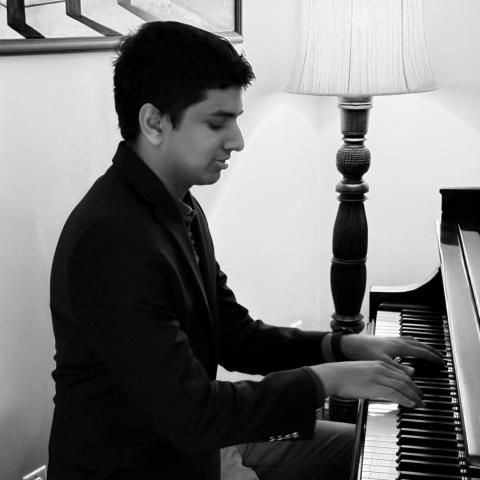Kurt Maas Award Builds Bridge with Berklee

Ivan Lins (left) and Marco Pignataro (right) at the Kurt Maas Jazz Award concert.
Image by George Giakis
Marco Pignataro recalls being in the audience this summer when German jazz guitarist Elias Prinz and his trio took the stage at Munich’s Isarphilharmonie concert hall. Prinz, a 23-year-old student at the Jazz Institute at the University of Music and Performing Arts Munich, had just won first place in the institute’s renowned Kurt Maas Jazz Award competition, and his set followed high-octane jazz displays by the competition’s second- and third-place winners. But as Prinz settled in and began strumming his opening chords, the tone of the evening shifted.
“When he started playing, I was like, ‘What? What is this?’” says Pignataro, the artistic director of the Berklee Global Jazz Institute (BGJI). “And then I was like, ‘Oh, wait a second. This is really special.” In contrast to the performances earlier in the evening, Prinz’s music was intimate and unusual, influenced by the music of Django Reinhardt.
“I felt he was bringing something not just that he loves but that he identifies [with] in a way that was extremely convincing,” Pignataro says. “So it wasn’t like hearing something nostalgic from the past. To me, he made that music really in-the-moment. He made it very relevant.” After the set, he says, the audience went crazy. “[Prinz] was playing in a way that everybody could really connect with the emotions…it was how musical he was, how brilliantly expressive he was with his own music.”
As first-place winner, Prinz earned a full scholarship to Berklee’s Aspire: Five-Week Music Performance Intensive this past summer. Now in its 10th year, the biennial competition honors the legacy of Kurt Maas '65, a jazz pioneer who for years was the exclusive distributor of Berklee publications in Germany and who founded and developed the Jazz Institute in Munich.
“He was the guy who started academic jazz education in Munich,” says Camilo Dornier '81, who confounded the award with institute chair Claus Reichstaller and funds the prizes.

The Elias Prinz Trio plays at the Kurt Maas Award competition ceremony.
Image by Gregory Giakis
In the late ’70s, Dornier had been a student of classical music when he took a noncredit class for jazz enthusiasts that Maas taught. On Maas’s recommendation, Dornier came to Berklee to further explore jazz.
When Maas died in 2011, Dornier wanted to find a way to honor him. The following year, he and Reichstaller came to Boston, where Abraham Laboriel Sr., B.M. '72. '05H connected them with then-President Roger Brown, who liked their idea for the Kurt Maas Jazz Award.
Now, as Dornier and Reichstaller eye the future, they are working to expand the award program. Two years ago, they began developing partnerships with two Brazilian schools, including Berklee academic partner Faculdade e Conservatório Souza Lima, and now offer scholarships that send two Brazilian students to Munich for four weeks. This year, part of the award ceremony concert was dedicated to Ivan Lins, a superstar of Brazilian music who, along with Pignataro, performed as a special guest artist.
In addition to building out the Brazilian program, Dornier and Reichstaller are looking to deepen the institute’s involvement with Berklee. Their goal is to offer first-place winners a semester at Berklee, and possibly to develop a student and faculty exchange. Pignataro says such a program would be valuable not only for the Munich institute but also for the BGJI.
The possibilty of benefitting from such an exchange was one of the reasons Prinz took part in the competition, which is open only to Jazz Institute students. He had been playing guitar since he was 5 and studying Reinhardt since the age of 12, and wanted to come to Berklee to deepen his knowledge of other jazz genres.
He arrived in Boston freshly graduated from the Jazz Institute in Munich, but he still found a level at Five-Week that was well-suited to him. “I can improve [upon] everything I learned the last four years. And because it’s so intensive, I feel like I learned very, very quickly,” he says. After the program, Prinz returned to Germany to work on his first album. In the meantime, he’ll continue to play in Munich and share his influences from Berklee.
It’s this type of sharing and enrichment that will keep jazz alive, Dornier says. “I think we have to be aware that jazz on the global scale is a very small, tiny percentage of music. To be strong, to keep this whole thing running, we have to think internationally, we have to cooperate, we have to exchange, and we have to work together.”




